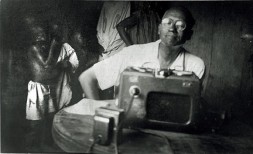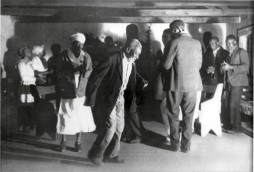“Word, Shout, Song”
The Anacostia Community Museum exhibition “Word, Shout, Song: Lorenzo Dow Turner Connecting Community through Language” looks at the life, research and scholarship of Lorenzo Dow Turner, perhaps the first African American linguist.
Curated by Alcione Amos, “Word, Shout, Song” is three stories in one: scholarship and success against the odds, a quest to crack a linguistic code and a discovery spanning continents. The exhibition presents Turner’s pioneering work, which in the 1930s established that people of African heritage, despite slavery, had retained and passed on their cultural identity through words, music and story wherever they landed.

Lorenzo Dow Turner recording informants in Africa. (Photo courtesy Lorenzo Dow Turner Papers, Anacostia Community Museum Archives)
His research focused on the Gullah/Geechee community in South Carolina and Georgia, whose speech was dismissed as “baby talk” and “bad English.” He confirmed, however, that the Gullah spoke a Creole language and that they still possessed parts of the language and culture of their captive ancestors. Further linguistic explorations into the African diaspora led him to Bahia, Brazil, where he further validated his discovery of African continuities.
“In assembling this exhibition, most exciting to me was how I was able to connect words from Portuguese, Gullah and English to their African origins, 80 years later, based on Turner’s work in the 1930s,” said Amos. “His work is still relevant today.”
The exhibition begins with a look at Turner’s early life. He was profoundly influenced by his Howard University-educated father—a fourth-generation freed man forced to flee his home after an altercation with a white man—on the importance of academic excellence. Turner (1890-1972) obtained successively higher degrees in English from Howard, Harvard University and the University of Chicago. Denied teaching positions at white institutions, he built his career in academia at several black colleges. It was while teaching at the now-South Carolina State University that Turner first heard and was captivated by the Gullah dialect. Convinced that the speech pattern was not illiterate English but a distinct language incorporating words and structure from African languages, Turner focused his interest into a lifelong project.

Members of the Gullah community in Georgia express their spirituality through the “ring shout” during a service at a local “praise house” ca. 1930s. (Photo courtesy of Lorenzo Dow Turner Papers, Anacostia Community Museum Archives)
Turner studied various African languages, including Twi, Ewe, Yoruba, Bambara and Wolof as well as Arabic, to make linkages to Gullah vocabulary. Through his pursuit of information, he often became the first African American member of many organizations, including the Linguistics Society of America.
“Word, Shout, Song” recounts his travels to South Carolina and Georgia and abroad to record and compare the speech of hundreds of informants. His journeys feature fascinating stories of adventure and discovery as well as the difficulties he encountered with bulky equipment and remote access.
A major linguistic achievement occurred when Turner determined that the “ring shout,” a Gullah religious dance, was directly inherited from enslaved Muslims—the name “shout” derived from the Arabic word Sha’wt, which had to do with movement around a sacred object rather than sound. Turner’s early Georgia recordings led to later discoveries by scholars Joseph Opala, Tazieff Schmidt and Cynthia Koroma who, in 1990, realized that a song passed down through generations connected the Mende people of Sierra Leone to their American descendents in Georgia.
Turner’s many writings, presentations and publications included his book, Africanisms in the Gullah Dialect, published in 1949, and still the standard reference for Creole language research today.
“Word, Shout, Song” opens August 9 and will be on view through March 2011.
Posted: 4 August 2010
-
Categories:
Anacostia Community Museum , History and Culture , News & Announcements



